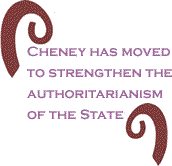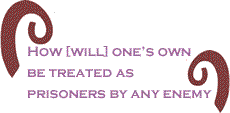
|
|||||||||||||||||||||||
 |
|

Custom Search
|
|
 |
|
It
is fairly unusual for the immediate past President or Vice President
of the
In Cheney’s recent attack dog appearance in defense of torture it was fascinating to watch him become the defender of the Central Intelligence Agency. One does not have to be a great historian to remember that Cheney was a constant opponent and degrader of the CIA, but when it was convenient, Cheney was able to flip the script and become the defender of his former adversaries. It was also interesting to watch Cheney suggest, despite ALL evidence to the contrary, that President Obama does not wish to talk about terrorists. Let’s add to this Cheney’s slight of hand when it came to attacking former Secretary of State Colin Powell. When asked about Powell’s political affiliations, Cheney - very calmly - suggested that he did not even know that Powell still considered himself a Republican. Unless Cheney has morphed from an attack dog into Rip Van Winkle he would have to have known that Powell remains a Republican, but clearly the facts do not matter here. The objective is the sound-bite, the insult and the impression left in the minds of the listener.
Cheney’s appearance is aimed at strengthening the stamina of what could be called the “revanchist Right,” that is the revenge-seeking Right; the Right that is absolutely furious not only that they lost the 2008 elections, but that they lost to a Black man. The revanchist Right is that segment of the political Right (which actually overlaps different right-wing political tendencies) that supported the unilateralism of the Bush / Cheney administration against the notion of any sort of multi-lateral imperial world domination (more akin to the politics of Clinton and Obama). Cheney
is extremely good at ignoring facts. Actually, Cheney goes beyond
ignoring facts; he disputes them or dismisses them entirely. Cheney
will never admit that there were no weapons of mass destruction
in The
matter of torture, then, becomes an excellent tactic in the efforts
towards greater authoritarianism. Cheney can argue that the methods
used by the Cheney’s aim is to strengthen the irrationalism on the part of the political Right. He ignores why governments have established treaties over the centuries regarding the treatment of prisoners of war, for example. The treatment of prisoners of war and the issue of torture have little to do with high-minded morals. Rather it revolves around the question of how one’s own will be treated as prisoners by any enemy should they be captured as well as whether barbaric treatment can be used to isolate an opponent. The classic example of this, of course, was Hitler’s failure to use chemical weapons during World War II, which was certainly not about moralism, but concerned the potential for various forms of blow-back - literally and figuratively.
BlackCommentator.com
Executive Editor, Bill Fletcher, Jr., is a Senior Scholar with the
Institute for Policy Studies,
the immediate past president of TransAfrica Forum and co-author of, Solidarity Divided: The Crisis in Organized Labor and a New Path
toward Social Justice |
|
Any BlackCommentator.com article may be re-printed so long as it is re-printed in its entirety and full credit given to the author and www.BlackCommentator.com. If the re-print is on the Internet we additionally request a link back to the original piece on our Website. Your comments are always welcome. eMail re-print notice
If you send us an eMail message we may publish all or part of it, unless you tell us it is not for publication. You may also request that we withhold your name. Thank you very much for your readership. |
|
| |
|
| May
28, 2009 Issue 326 |
|
| Executive Editor: Bill Fletcher, Jr. |
| Managing Editor: Nancy Littlefield |
| Publisher: Peter Gamble |
| Est. April 5, 2002 |
Printer Friendly Version
in resizeable plain
text format or pdf
format. |
| Frequently Asked Questions |
 |

|
 |
 |
 |
| |
| |




























 Yet
the devil’s horns do not emerge simply because of Cheney as an unprincipled
debater. The significance of Cheney’s emergence as the 2009 rabid
attack dog revolves around right-wing strategy. From almost the
moment of Obama’s election, but certainly following his Inauguration,
the right-wing has been engaged in an interesting effort at a combination
of destabilization along with obfuscation. An interesting example
was the way that the right-wing attempted to portray - about 30
minutes after Obama was inaugurated - the economic crisis as now
being an Obama crisis. They have systematically worked to twist
the actual facts and play to fears, particularly the fears of the
white electorate.
Yet
the devil’s horns do not emerge simply because of Cheney as an unprincipled
debater. The significance of Cheney’s emergence as the 2009 rabid
attack dog revolves around right-wing strategy. From almost the
moment of Obama’s election, but certainly following his Inauguration,
the right-wing has been engaged in an interesting effort at a combination
of destabilization along with obfuscation. An interesting example
was the way that the right-wing attempted to portray - about 30
minutes after Obama was inaugurated - the economic crisis as now
being an Obama crisis. They have systematically worked to twist
the actual facts and play to fears, particularly the fears of the
white electorate.
 Cheney’s
‘horns’ should not be dismissed as representing the anger of a dysfunctional
and evil personality. The demonism represented by Cheney is not
mainly personal. Rather it represents the efforts of a segment of
the Right to save itself from annihilation and to regain the upper
hand. Appealing to fear and prejudice has often been a useful instrument
to accomplish this. After all, the extreme political Right never
has to be constrained by the truth.
Cheney’s
‘horns’ should not be dismissed as representing the anger of a dysfunctional
and evil personality. The demonism represented by Cheney is not
mainly personal. Rather it represents the efforts of a segment of
the Right to save itself from annihilation and to regain the upper
hand. Appealing to fear and prejudice has often been a useful instrument
to accomplish this. After all, the extreme political Right never
has to be constrained by the truth.





